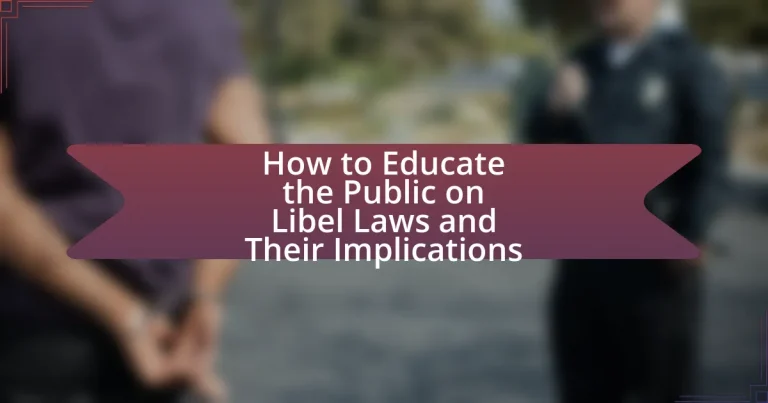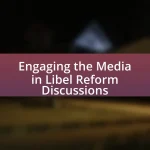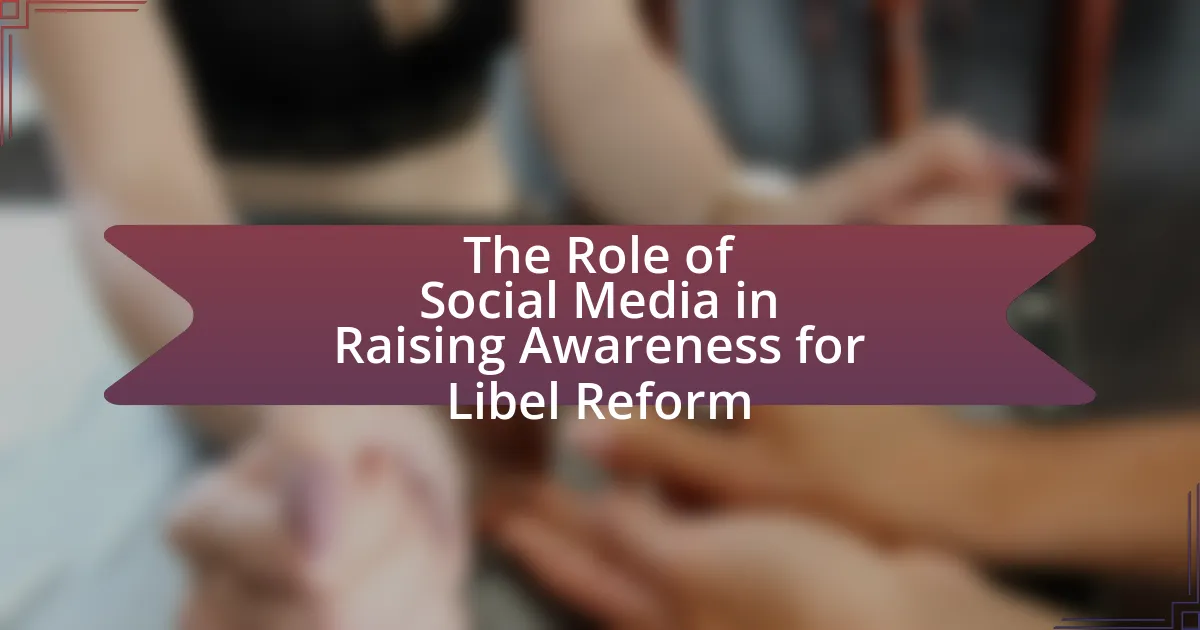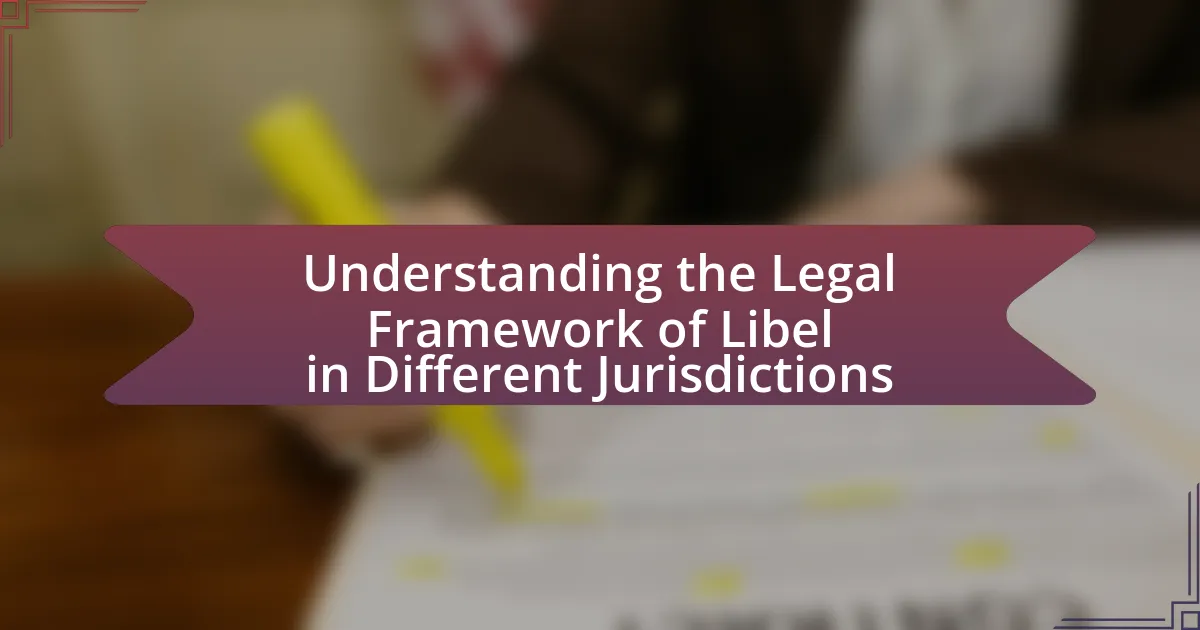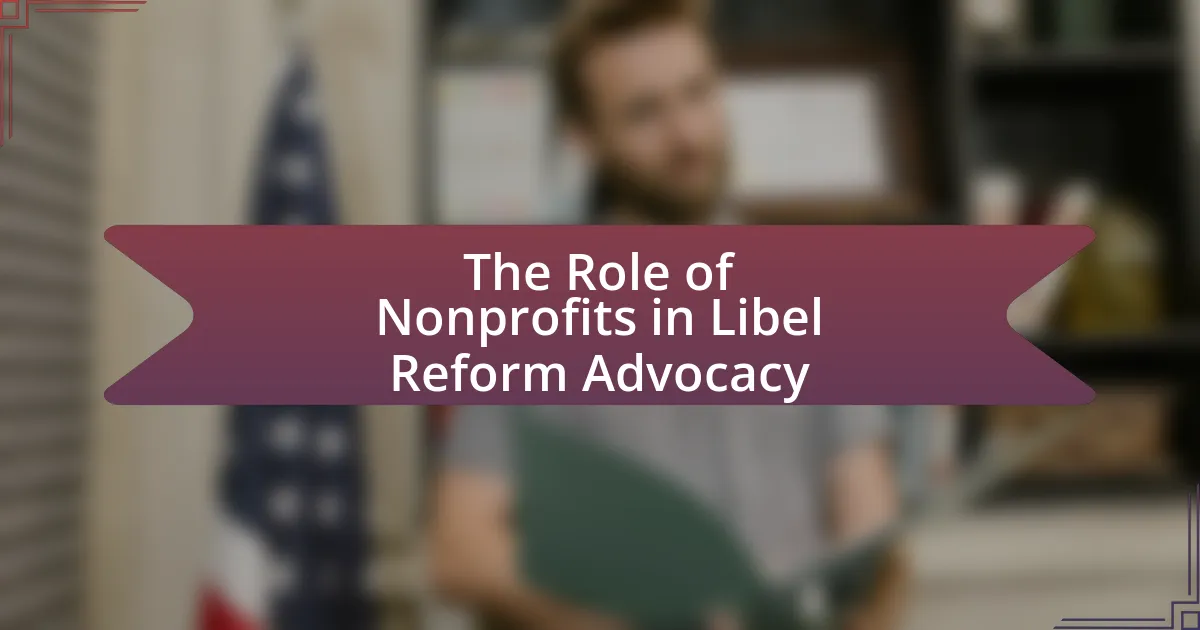Libel laws are legal statutes designed to protect individuals and organizations from false statements that can damage their reputation. This article outlines the significance of libel laws, differentiating them from slander laws, and detailing the legal definitions and implications of libel. It discusses the potential consequences of libel, including legal repercussions and reputational harm, and emphasizes the necessity of public education on these laws to prevent misinformation and promote responsible communication. Additionally, the article explores effective methods for educating the public, such as community engagement, workshops, and online resources, while highlighting the societal implications of misunderstanding libel laws.
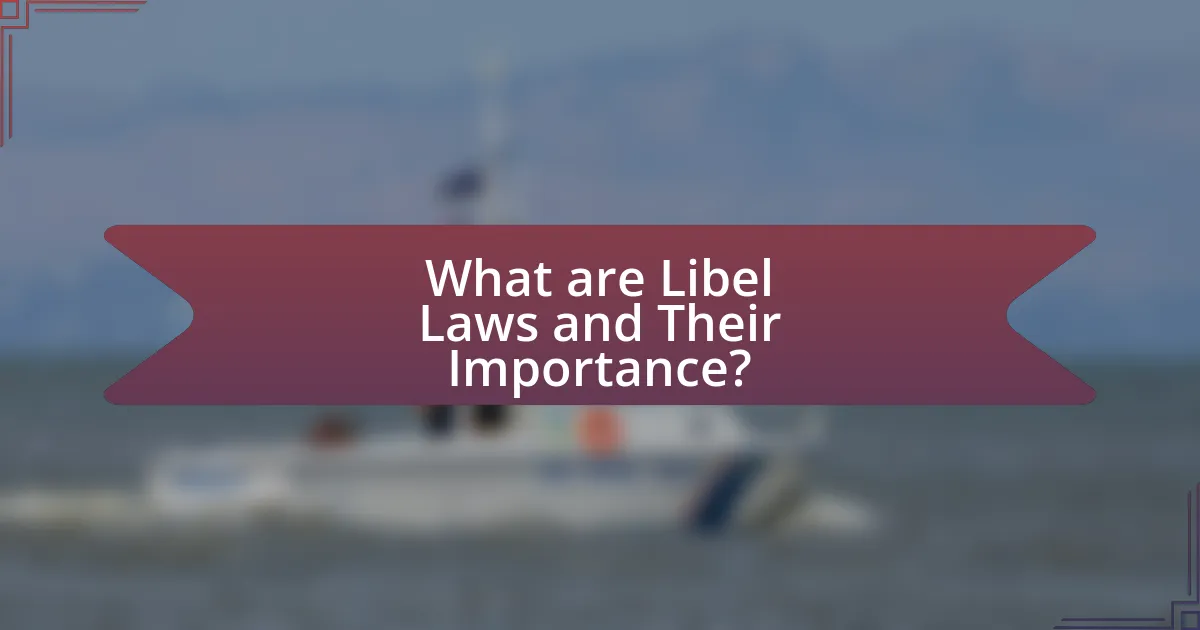
What are Libel Laws and Their Importance?
Libel laws are legal statutes that protect individuals and organizations from false statements that can harm their reputation. These laws are crucial because they provide a framework for addressing defamation, ensuring that victims can seek redress for damages caused by untrue statements. For instance, in the United States, the landmark case New York Times Co. v. Sullivan established that public figures must prove actual malice to win a libel case, highlighting the balance between free speech and protecting reputations. This legal protection is essential for maintaining trust in public discourse and media, as it discourages the spread of misinformation and promotes accountability.
How do Libel Laws differ from Slander Laws?
Libel laws differ from slander laws primarily in the medium through which the defamatory statements are made. Libel refers to written or published defamatory statements, while slander pertains to spoken defamatory statements. This distinction is significant because libel is generally considered more harmful due to its permanence and the potential for wider dissemination, which can lead to greater reputational damage. For instance, in many jurisdictions, the burden of proof may shift in libel cases, requiring the defendant to prove the truth of the statement, whereas in slander cases, the plaintiff often must demonstrate actual damages unless the statement falls into a category of slander per se, which is inherently damaging.
What constitutes libel in legal terms?
Libel in legal terms constitutes a false statement presented as a fact that injures a person’s reputation. To qualify as libel, the statement must be published, meaning it is communicated to a third party, and it must be made with a degree of fault, typically negligence or actual malice, depending on whether the subject is a public figure or a private individual. Legal precedents, such as the landmark case New York Times Co. v. Sullivan, establish that public figures must prove actual malice to succeed in a libel claim, while private individuals only need to demonstrate negligence.
Why is understanding the difference between libel and slander crucial?
Understanding the difference between libel and slander is crucial because it directly impacts legal accountability and the protection of reputation. Libel refers to written defamatory statements, while slander pertains to spoken defamatory remarks. Recognizing this distinction helps individuals and organizations navigate legal frameworks effectively, ensuring they can defend against false accusations or pursue claims for damages appropriately. For instance, in the United States, the burden of proof and potential damages can vary significantly between the two, with libel often resulting in higher damages due to its permanence. This understanding is essential for informed public discourse and legal compliance.
What are the potential consequences of libel?
The potential consequences of libel include legal repercussions, financial damages, and reputational harm. Individuals or entities found guilty of libel may face civil lawsuits, resulting in monetary compensation awarded to the victim for damages incurred, which can range from thousands to millions of dollars depending on the severity of the case. Additionally, libel can lead to significant damage to the reputation of the accused, affecting personal relationships, professional opportunities, and public perception. In the United States, the landmark case New York Times Co. v. Sullivan established that public figures must prove actual malice to win a libel case, highlighting the legal complexities involved.
How can libel affect individuals and organizations?
Libel can significantly harm individuals and organizations by damaging their reputations and leading to financial losses. When false statements are published, individuals may experience emotional distress, loss of employment opportunities, and social ostracism, while organizations may face decreased sales, loss of partnerships, and legal costs associated with defending against libel claims. According to a study by the Media Law Resource Center, libel cases can result in substantial monetary damages, with awards sometimes exceeding millions of dollars, highlighting the serious financial implications for both parties involved.
What legal actions can be taken in response to libel?
In response to libel, individuals can pursue legal actions such as filing a civil lawsuit for damages, seeking a retraction or correction of the defamatory statement, and in some jurisdictions, pursuing criminal charges against the perpetrator. A civil lawsuit allows the victim to claim compensation for harm to reputation, emotional distress, and financial losses caused by the libelous statement. Seeking a retraction can mitigate damages and restore reputation, while criminal charges may apply in cases of malicious intent or severe defamation. These actions are supported by libel laws that protect individuals from false statements that can harm their reputation.
Why is public education on libel laws necessary?
Public education on libel laws is necessary to ensure individuals understand their rights and responsibilities regarding free speech and defamation. Knowledge of libel laws helps prevent the dissemination of false information that can harm reputations, as well as protects individuals from unwarranted legal consequences. For instance, in the United States, the landmark case New York Times Co. v. Sullivan established that public figures must prove actual malice to win a libel case, highlighting the balance between free expression and protection against defamation. Educating the public about these nuances fosters responsible communication and reduces the likelihood of legal disputes.
How does misinformation about libel laws contribute to public confusion?
Misinformation about libel laws contributes to public confusion by creating misunderstandings regarding what constitutes libel and the legal protections available. For instance, many individuals mistakenly believe that any negative statement about a person is automatically libelous, which is not true; libel requires false statements made with negligence or actual malice. This confusion is exacerbated by sensational media coverage and social media platforms that often oversimplify or misrepresent legal concepts. According to a study by the American Bar Association, a significant portion of the public lacks basic knowledge about libel, leading to misinterpretations that can result in fear of speaking out or sharing opinions.
What role does media literacy play in understanding libel laws?
Media literacy plays a crucial role in understanding libel laws by equipping individuals with the skills to critically evaluate information and discern factual accuracy. This understanding is essential because libel laws protect individuals from false statements that can harm their reputation, and a media-literate public is better able to identify potentially defamatory content. Research indicates that individuals with higher media literacy are more adept at recognizing biased or misleading information, which directly correlates with a reduced likelihood of engaging in libelous behavior. For instance, studies show that media literacy education can lead to improved comprehension of legal concepts, including the nuances of truth and opinion in relation to libel.
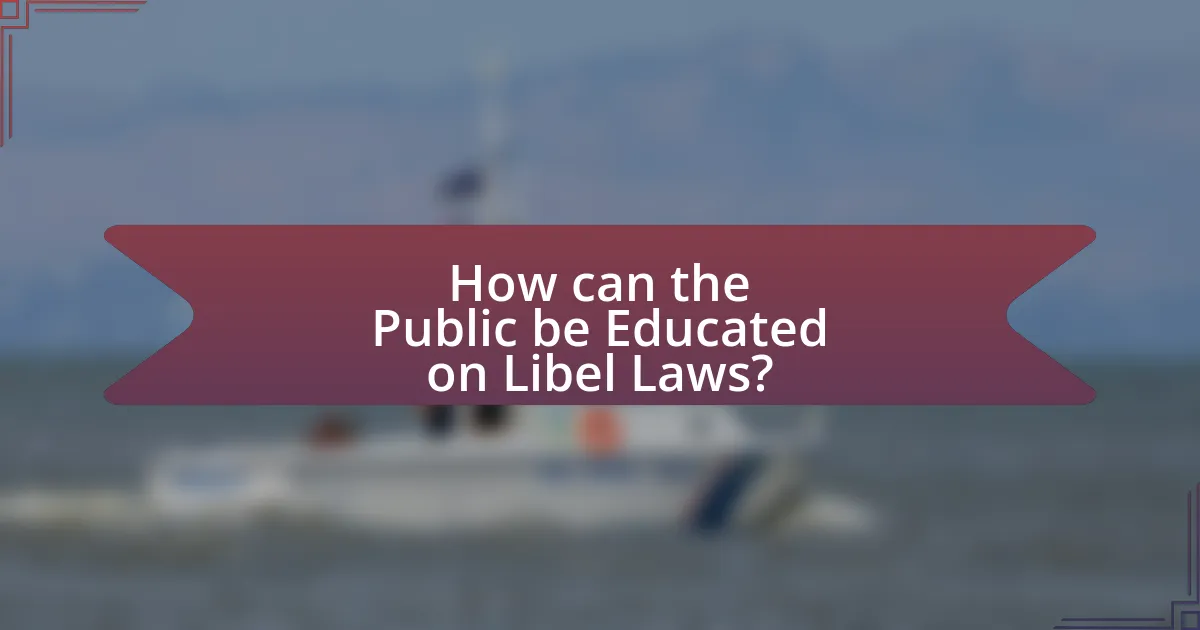
How can the Public be Educated on Libel Laws?
The public can be educated on libel laws through comprehensive awareness campaigns that include workshops, informational websites, and community seminars. These initiatives can provide clear explanations of what constitutes libel, the legal consequences of libelous statements, and the importance of truth and context in public discourse. For instance, organizations like the Media Law Resource Center offer resources and training that help individuals understand their rights and responsibilities regarding libel. Additionally, incorporating case studies of notable libel cases can illustrate the real-world implications of these laws, making the information more relatable and impactful.
What methods are effective for educating the public about libel laws?
Effective methods for educating the public about libel laws include community workshops, online courses, and informational campaigns. Community workshops provide interactive learning experiences where participants can engage with legal experts and ask questions, enhancing understanding. Online courses offer accessible, self-paced learning opportunities that can reach a broader audience, allowing individuals to learn at their convenience. Informational campaigns, utilizing social media and traditional media outlets, can disseminate key information about libel laws, making it easier for the public to grasp the implications of these laws in everyday situations. These methods have been shown to increase awareness and understanding of legal rights and responsibilities related to libel, as evidenced by various legal education initiatives that report improved public knowledge following such programs.
How can workshops and seminars enhance understanding of libel laws?
Workshops and seminars can enhance understanding of libel laws by providing interactive, real-world scenarios that illustrate the complexities of these laws. Participants engage in discussions led by legal experts, which allows for clarification of legal terminology and concepts. Research indicates that experiential learning, such as role-playing and case studies, significantly improves retention of legal knowledge. For instance, a study published in the Journal of Legal Education found that students who participated in practical workshops demonstrated a 30% increase in their understanding of libel law compared to traditional lecture-based learning. This hands-on approach fosters critical thinking and equips individuals with the skills to navigate potential legal pitfalls in communication.
What role do online resources play in educating the public?
Online resources play a crucial role in educating the public by providing accessible information on various topics, including libel laws and their implications. These resources, such as websites, online courses, and social media platforms, enable individuals to learn at their own pace and access a wide range of materials, from legal definitions to case studies. For instance, the American Bar Association offers online articles and webinars that explain libel laws, helping to demystify complex legal concepts for the general public. This accessibility fosters greater awareness and understanding, empowering individuals to navigate legal issues more effectively.
How can community engagement improve awareness of libel laws?
Community engagement can significantly improve awareness of libel laws by facilitating direct communication and education among community members. Through workshops, seminars, and discussions led by legal experts, individuals can gain a clearer understanding of what constitutes libel and the legal ramifications associated with it. For instance, a study by the American Bar Association found that community outreach programs increased participants’ knowledge of legal issues, including libel, by over 50%. This engagement not only informs the public but also encourages dialogue, allowing individuals to share experiences and ask questions, thereby reinforcing their understanding of libel laws and their implications.
What partnerships can be formed to promote libel law education?
Partnerships with educational institutions, legal organizations, and media outlets can be formed to promote libel law education. Educational institutions can integrate libel law into their curricula, while legal organizations can provide resources and expert speakers for workshops. Media outlets can collaborate on public awareness campaigns that highlight the importance of understanding libel laws. These partnerships leverage the expertise and reach of each entity, ensuring comprehensive education on the implications of libel laws for various audiences.
How can social media campaigns effectively raise awareness?
Social media campaigns can effectively raise awareness by utilizing targeted messaging and engaging content that resonates with specific audiences. These campaigns leverage platforms like Facebook, Twitter, and Instagram to disseminate information quickly and widely, reaching millions of users. For instance, a study by the Pew Research Center found that 69% of adults in the U.S. use social media, making it a powerful tool for spreading awareness about important issues, such as libel laws. By creating shareable graphics, informative videos, and interactive posts, campaigns can encourage user participation and foster discussions, thereby amplifying their reach and impact.
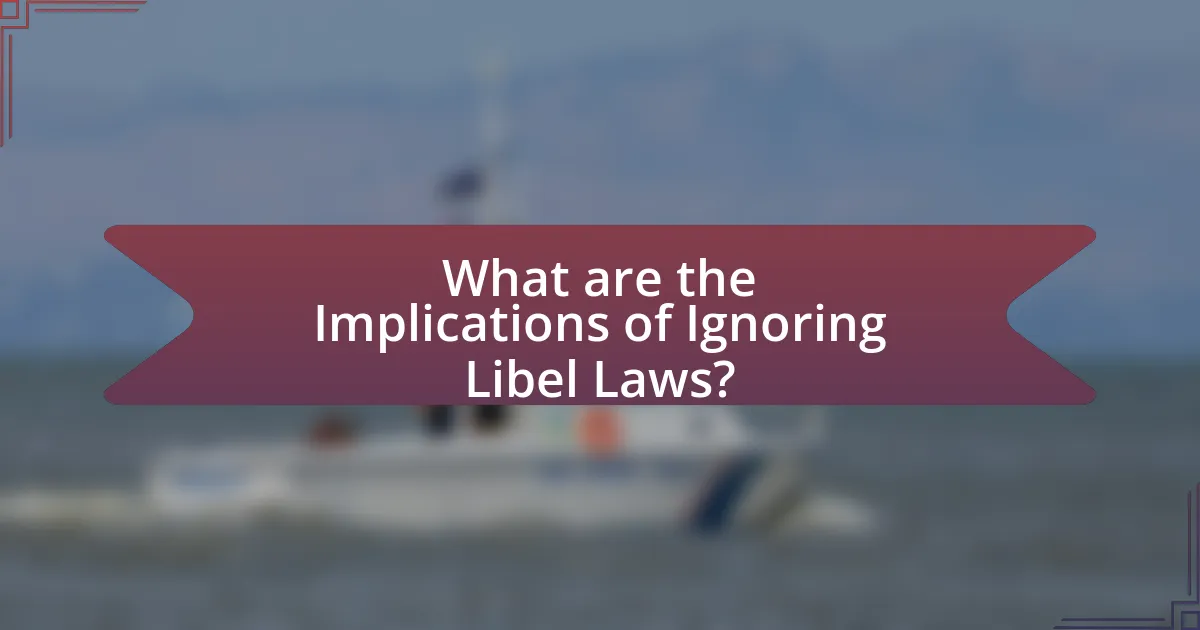
What are the Implications of Ignoring Libel Laws?
Ignoring libel laws can lead to significant legal consequences, including financial penalties and damage to reputation. When individuals or organizations fail to adhere to these laws, they risk being sued for defamation, which can result in costly settlements or judgments. For instance, in the United States, a successful libel claim can lead to compensatory damages, punitive damages, and the payment of legal fees, which can amount to hundreds of thousands or even millions of dollars. Additionally, ignoring libel laws can erode public trust and credibility, as false statements can harm individuals’ reputations and lead to a loss of professional opportunities. Therefore, understanding and respecting libel laws is crucial to avoid these severe implications.
What risks do individuals face when they are unaware of libel laws?
Individuals who are unaware of libel laws face significant risks, including the potential for legal action and financial liability. When individuals make false statements about others, they may inadvertently expose themselves to lawsuits for defamation, which can result in costly settlements or judgments. For instance, in the United States, the average defamation lawsuit can lead to damages ranging from thousands to millions of dollars, depending on the severity of the claim and the jurisdiction. Additionally, a lack of understanding of libel laws can lead to reputational harm, as individuals may spread misinformation that damages the reputation of others, further complicating their legal standing.
How can ignorance of libel laws lead to legal troubles?
Ignorance of libel laws can lead to legal troubles by causing individuals or organizations to make false statements about others, which can result in lawsuits. When a person publishes defamatory content without understanding the legal definitions and implications of libel, they risk being held liable for damages. For instance, in the United States, a plaintiff must prove that the statement was false, damaging, and made with actual malice if the plaintiff is a public figure. Failure to recognize these elements can lead to costly legal battles and reputational harm. Legal precedents, such as New York Times Co. v. Sullivan, highlight the importance of understanding libel laws, as ignorance can result in significant financial penalties and legal consequences.
What are the societal implications of widespread misunderstanding of libel laws?
Widespread misunderstanding of libel laws can lead to significant societal implications, including the chilling effect on free speech and the potential for increased censorship. When individuals misinterpret what constitutes libel, they may refrain from expressing opinions or sharing information due to fear of legal repercussions, thereby stifling public discourse. This phenomenon is supported by research indicating that a lack of understanding about legal boundaries can result in self-censorship, as seen in surveys where journalists reported hesitance to publish controversial stories due to fear of libel suits. Furthermore, the misapplication of libel laws can lead to wrongful accusations and legal actions against individuals or media outlets, creating an environment where misinformation proliferates unchecked. This cycle can undermine trust in media and public institutions, as citizens may become wary of engaging with content that could be perceived as legally risky.
How can individuals protect themselves from libel claims?
Individuals can protect themselves from libel claims by ensuring that any statements made about others are true and can be substantiated with evidence. This involves fact-checking information before sharing it, especially in public forums or publications. Additionally, individuals should avoid making statements that could be interpreted as defamatory, such as unverified accusations or personal attacks. Understanding the legal definitions of libel and the standards for proving it, such as the requirement for the statement to be false and damaging, further aids in minimizing risk. Engaging in responsible communication practices, such as using disclaimers when expressing opinions, can also provide a layer of protection against potential libel claims.
What best practices should be followed when sharing information publicly?
When sharing information publicly, it is essential to verify the accuracy of the information before dissemination. Accurate information reduces the risk of spreading misinformation, which can lead to legal repercussions under libel laws. For instance, a study by the Pew Research Center found that 64% of Americans believe that misinformation is a major problem in society, highlighting the importance of fact-checking. Additionally, it is crucial to provide proper attribution to sources to maintain credibility and avoid plagiarism. This practice not only respects intellectual property rights but also enhances the reliability of the shared information. Furthermore, being aware of the legal implications of the content shared, including potential libel claims, is vital for responsible communication. Following these best practices fosters trust and accountability in public discourse.
How can individuals verify the accuracy of information before publication?
Individuals can verify the accuracy of information before publication by cross-referencing multiple credible sources. This process involves checking facts against reputable news outlets, academic journals, and official reports to ensure consistency and reliability. For instance, a study by the Pew Research Center found that 64% of Americans believe that verifying information from multiple sources is essential for accuracy. Additionally, utilizing fact-checking websites such as Snopes or FactCheck.org can provide further validation of claims. By employing these methods, individuals can significantly reduce the risk of disseminating false information, which is crucial in the context of libel laws and their implications.
What are the best practices for educating others about libel laws?
The best practices for educating others about libel laws include providing clear definitions of libel, using real-world examples to illustrate its implications, and emphasizing the importance of truth and public interest as defenses against libel claims. Clear definitions help individuals understand what constitutes libel, while real-world examples, such as notable court cases, demonstrate the consequences of libelous statements. Additionally, workshops or seminars can facilitate interactive learning, allowing participants to engage with the material and ask questions. According to the American Bar Association, educating the public about legal concepts like libel can enhance awareness and promote responsible communication, thereby reducing the risk of legal disputes.
How can educators incorporate libel law education into their curriculum?
Educators can incorporate libel law education into their curriculum by integrating case studies, interactive discussions, and practical assignments that focus on real-world applications of libel laws. For instance, analyzing landmark libel cases, such as New York Times Co. v. Sullivan, helps students understand the legal standards for defamation and the importance of free speech. Additionally, educators can create simulations where students draft articles and evaluate them for potential libel issues, fostering critical thinking about responsible journalism. This approach not only enhances students’ legal literacy but also prepares them for ethical decision-making in media-related fields.
What resources are available for teaching libel laws effectively?
Comprehensive resources for teaching libel laws effectively include legal textbooks, online courses, and case law databases. Legal textbooks such as “Media Law: A Practical Guide to Ethics and Law for Film” by David A. Anderson provide foundational knowledge on libel. Online platforms like Coursera and edX offer courses on media law that cover libel extensively. Additionally, databases like Westlaw and LexisNexis provide access to case law and legal precedents, which are crucial for understanding the application of libel laws in real-world scenarios. These resources collectively enhance the understanding of libel laws and their implications for educators and students alike.
